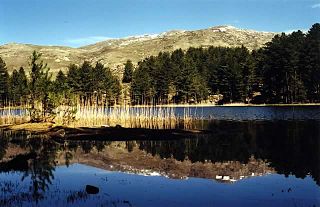
Lac de Bettaniella is a lake in Corsica, France. At an elevation of 2321 m, its surface area is 0.075 km². In French, it is sometimes alternatively known as Lac de Bellebone or Lac du Rotondo. It is the largest lake in Corsica.

Lac de l'Oriente is a lake in Corsica, France.

Lac de Goria is a lake in Corsica, France. At an elevation of 1852 m, its surface area is 0.04 km².
Polynucleobacter is a genus of Proteobacteria, originally established by Heckmann and Schmidt (1987) to exclusively harbor obligate endosymbionts of ciliates belonging to the genus Euplotes.
Polynucleobacter necessarius is a bacterium of the genus Polynucleobacter.
Polynucleobacter acidiphobus is an aerobic, chemo-organotrophic, catalase- and oxidase-positive, nonmotile bacterium of the genus Polynucleobacter. The type strain was isolated from a rock pool which was filled with fresh water in a mountain brook in Corsica in France.
Polynucleobacter rarus is an aerobic, chemo-organotrophic, catalase- and oxidase-positive, nonmotile bacterium of the genus Polynucleobacter, isolated from an acidic lake in Wisconsin.
Polynucleobacter duraquae is an aerobic, chemo-organotrophic, catalase- and oxidase-positive, sometimes motile, free-living bacterium of the genus Polynucleobacter, isolated from Lake Mondsee in Austria. The species represents planktonic bacteria (bacterioplankton) dwelling in alkaline freshwater systems.

Polynucleobacter meluiroseus is an aerobic, chemo-organotrophic, non-motile, free-living bacterium of the genus Polynucleobacter.
Polynucleobacter campilacus is an aerobic, catalase- and oxidase-positive, chemo-organotrophic, nonmotile, free-living bacterium of the genus Polynucleobacter., The type strain was isolated from Lake Feldsee located in the Southern Black Forest in Germany. The species epithet "campilacus" refers to the origin of the type strain from this lake. The complete genome sequence of the strain was determined. Among the described Polynucleobacter species, P. campilacus is closest related to P. hirudinilacicola.
Polynucleobacter hirudinilacicola is an aerobic, chemo-organotrophic, non-motile, free-living bacterium of the genus Polynucleobacter.

Lac de Calacuccia is a reservoir in the Haute-Corse department of France formed by damming the Golo river. It provides hydroelectric power and water for irrigation in the dry season.

Lac de Padula is a reservoir in the Haute-Corse department of France, on the island of Corsica. It was built to supply water for irrigation and firefighting, but now also provides drinking water during the summer tourist peak.

The Restonica is a small river in the department of Haute-Corse, Corsica, France. It is a tributary of the river Tavignano. The river has a steep and rocky course with many pools and waterfalls. The valley contains two lakes, and is a popular tourist destination.

The Lac de Creno is a small lake in the Monte Rotondo massif in the Corse-du-Sud department of France.

The Lac de Tolla is a reservoir in the Corse-du-Sud department of France on the island of Corsica. It is the largest lake on Corsica, and powers a hydroelectric plant.

The Prunelli is a small coastal river in the department of Corse-du-Sud, Corsica, France. It flows into the Golfe d'Ajaccio on the Mediterranean Sea.

The Ese is a river in the department of Corse-du-Sud, Corsica, France. It is a tributary of the Prunelli river, which it joins in the Lac de Tolla.













